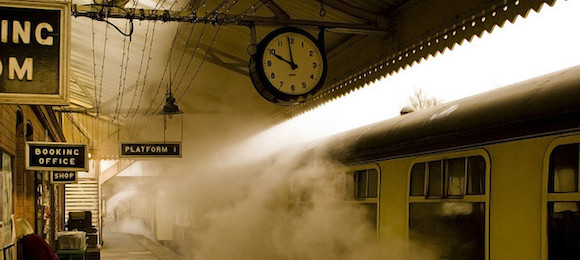
Photo by Stuart Richards
The train pulled into the station. It was in, it was sitting in the station. Platforms aligned, were they, yes, with the level of the doors. Maybe a song enters the head, or leaves it, if headphones are shed. They are being shed, still.
An accumulation in the aisle, the center, the expressway. Prescience lands some in the vestibule, peering out the windows, waiting.
Two people, together likely, talk and laugh. Standing with suitcases, shifting when weight becomes too much. The two people talk and laugh, and maybe kiss. She is saying something about Why can’t they understand that she something. Probably about her job. Laughing and kissing, certainly together.
One person, phone in hand, doesn’t stop looking at the phone. Or hasn’t. Looking and doing something with the phone. Keeps doing it.
Routine is a word here. Breaths are steady, decorum is standard, all perfectly routine. And why not. Simplicity is a virtue in travel. Words like efficiency, comfort, reliability. It’s the thing that’s in somebody’s life that should be least in somebody’s life. Meaning it shouldn’t be noticed.
The two that are together, still there obviously, start to look. Something different. They are looking. She is saying something about Why people are still something and she says The doors.
The doors. This is something. The something that should be nothing. Telepathy is not real, but it is. Others start looking. Phone person, looking.
Time is here, with everyone. In the station. The station. Time is not here when the train is going, or at the small stops, the towns with shops in them that aren’t large, with older people and their town things and cars and trees, and problems. Fortitude is a word here. Locality. Secondary. Time is not in these places. The going train does not have time, it can’t. Two points, simplicity. Arrival and departure are all it is. In between is not time. The train goes so time doesn’t have to. It is outside, while people are inside.
But time is here now, in the station. Last stop, said somebody maybe. Phone person turns, still looking. People start the looking at the watches, or the wrists, if there are no watches. It doesn’t matter. Some of the younger people with the phones. Phone person still looks at the wrist, because why not. He is the in between. He is the first to know both, and the last probably.
When the train goes, people are ruled over. Hegemony is a word here. Sitting, quiet, napping. Inside the train, the tin can. Outside the train, steps on the platform, the outside is big. People there walk, and walk where they please. But at the station people don’t know. They can’t walk where they please, because they are still in the train. But the dynamic is less stark, and people stand. In the station. People don’t know. The hegemony is blurred.
Decorum is still here, in the small air. But something shifting. A person, a new person, back and behind, standing near The doors. There is agony. Back and behind, glances, not looking. The person shifts, back and forth, with the movements of the head. The elbow raised, the right one, with the phone to the head. Emotion. She says But the train was late and now sitting. There is overcoming. Crying sometimes. The two together stand erect. Phone person is here.
Crying still, from the back and behind.
Decorum is here, more now, because of the screaming and the wailing. The other people are rigid because she can’t be. They compensate with the standing and the slight looking down, at nothing. Deliberate. And still she says something about The doors.
There is the thought, in the place somewhere, of maybe Asking a person or to Find out something. But the decorum is here, and somebody must have done it already. Besides even though time is happening it can’t happen for much longer before The doors and something about outside. Steps on the platform, new air. Soon.
The doors she is saying The doors she keeps saying. Keeps saying it, like that. She can’t help herself, and people can’t help but with decorum. And they try. Phone person has his phone in his pocket. He is trying with the standing.
Death could be here, with the people, with the train at the station and The doors. The woman with the wailing and the phone to the head, with the agony, could be death. As it happens in the world probably a lot because of time. Life is not a going train. There is time. Life and death are words here, because the train is in the station. It is in it.
There is no death on a train that is going.
The person with the wailing could be death, and the people with the decorum are just as they are in life. Standing with the looking at the nothing. And mostly because The doors. This is why death could be here. They are always there, The doors. And something about them. They have people standing.